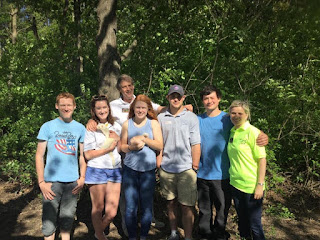* As the owner of a science and nature camp in Northern Wisconsin, parents often ask me for advice how we get kids excited about Nature. I think it is important for we as parents have to role model if we want our kids to follow. Here are some helpful hints.
* Today’s world has changed at rapid speed. As humans it is important we and our children relearn how importance makes time to breathe. Yes, long slow breaths as well as breathing in the calming sights, scents, and sounds of nature. From the simplest of watching a sunrise to the more difficult of learning the constellations. Being more involved with nature will make you feel more awake and attuned to the natural world around you. It will refresh and energize your body and mind
So why this connection to nature? Since the beginning of time, we were a part of nature it is only in very recent times that we have evolved to a point that mankind can live a life filled with screens and void of nature. Yet, deep down inside the natural world brings us joy. This excitement and pleasure have been essential to our survival.
Today is the day that we need to consciously bring our kids back to nature. We all can recall the days as kids we went outside for hours at a time often unsupervised. This time brought us closer to nature, made us more independent and more thoughtful of our friends. Plus, those kids that play unstructured tend to have a greater connection to animals. David Petersen puts it this way, “Without our fellow animals, we would not be human. Animals and what remains of the wild, natural world are central to our emotional as well as biological well-being.”
So how do we connect kids back to science and nature? Below is a list of just a few simple things you can do with your children.
Connect
Take time around your yard or neighborhood to find that special place. A place that connects with you. a place that brings renews your soul. In his book, A Sense of Place, artist, and conservationist Alan Gussow say, “As humans, we require support for our spirits, and this is what certain kinds of places provide. A place is a piece of the whole environment that has been claimed by feeling.” Then take your children to this spot. Tell them what it does for you and help make it “your connection spot” if you do this you will be imprinted on your children how important Nature is to you. They will remember this special place in their hearts forever.
Commitment
Obviously, while at this special place you will be modeling for your child a relationship with nature. The best way to do this is to regularly visit your place on a semi-regular basis. Be sure that at each visit you and your child look for how many “new” things you can observe, you will be amazed.
Journal
Keeping a journal of your experiences and observations is easy and rewarding, plus it gives you and your child to go back and reflect on all the things you did see out in nature. Journals can be filled with many things such as the identification of plants and animals, reflective writing, thoughts, facts, descriptions, sketches, questions, charts or even a little nature-based poetry. Here are some helpful hints:
Environment-Make a habit of writing down the date, time, location, weather, wind, cloud conditions, and your overall impressions each time you visit your place.
Draw-Many people hesitate to draw but don’t worry about the artistic quality of your sketches. Drawing is a great tool for recording information and will sharpen your ability to observe, identify and pick up on subtle details — you’ll come to terms with your subjects in new ways.
· Draw things you see overhead, landscapes, and even the small creatures.
· Do quick sketches: 15, 20, 30 seconds.
· Sketch something and then write notes beside and/or around the sketch.
Make Lists
The listing can celebrate your discoveries, keep your thoughts organized.
List what you see, smell, hear, feel, think about — lists can be about anything.
Reflect
Spend time writing about what you’ve observed and how it has affected you. Let your words flow without pausing to revise. Follow threads of thought to see where they take you.
Use All Your Senses
Hearing, Smelling, Touching, Sight and even Tasting
Use your resources; show your children that you do not need to Google everything. Take your notes and drawing compare them to field guides, consult dictionaries, try and build your nature vocabulary and an overall understanding of what you observe.
With this knowledge, you and your child will more clearly be becoming aware of the larger web of life on which we all depend. Perhaps the poet Gary Snyder said it best when he wrote, “Nature is not a place to visit, it is home.” So, take time to cherish the natural world as your home, and it will always reward you.






No comments:
Post a Comment